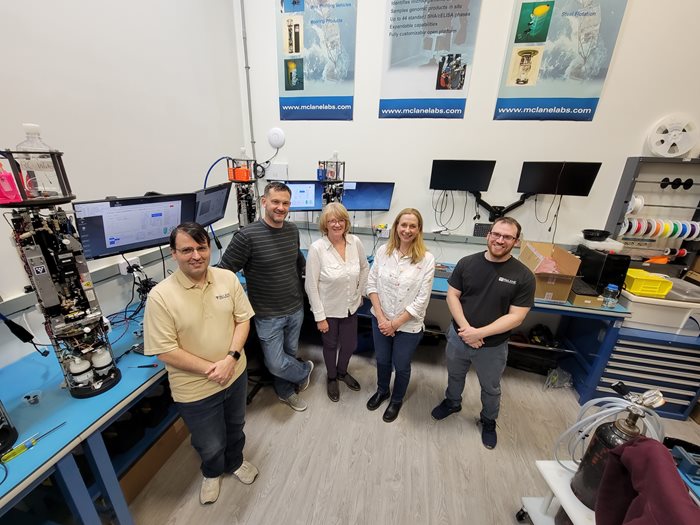Story
PML scientists in US as part of advanced plankton imaging project
3 March 2023

Image credit: McLane Labs
PML scientists Claire Widdicombe and Elaine Fileman have been in Massachusetts this week for training with our new Imaging FlowCytobot from McLane Research Laboratories Inc.
The submersible technology will be deployed at our L4 coastal station in the Western Channel Observatory and will offer advanced monitoring of plankton in-situ - automatically generating high-resolution images directly from the site.
It is a fundamental part of our exciting new Automated, in situ Plankton Imaging and Classification System (APICS), where the technology will be paired with another new piece of equipment from Plankton Analytics - a ‘Plankton Imager’. The pairing of the two automated plankton imaging instruments will allow scientists to monitor plankton from 10microns to 10mm continuously.
Images will be forwarded directly to our laboratory via an advanced high-speed communications network and automatically classified using associated machine learning software.
The Imaging FlowCytobot project lead Claire Widdicombe said:
“We have had a fantastic week at McLane Labs learning about this technology and how we can put it into practice, which really paves the way for the future of marine sampling. It offers a radically more sustainable solution to sampling. Traditional sampling involves using a research vessel and crew, which can be expensive and logistically challenging, and of course, leaves an environmental footprint. APICS offers a clear solution through autonomous data collection.”
.jpg)
Above: Elaine and Claire familiarising themselves with the Imaging FlowCytobot.
“The new Imaging FlowCytobot will also collect a higher range and frequency of data than we could ever possibly collect ourselves. And, alongside the automated classification, images can be classified to the genus or even species level with demonstrated accuracy comparable to that of human experts. This will also relieve some manual work and free up resources."
APICS is expected to be deployed at the L4 monitoring site later this year, joining a suite of complementary state-of-the-art scientific instruments.
Dr James Fishwick, Head of Smart Sound Plymouth and Head of Operations and Technology, Western Channel Observatory, said:
“Plymouth Marine Laboratory already has long-standing experience in more sustainable areas of oceanographic research, including autonomous data collection; through our moored data buoys and mobile autonomous platforms like our Autonaut and EcoSubs, as part of the National Centre for Coastal Autonomy. We are very excited to have the Imaging FlowCytobot and Plankton Imager join our existing technology to complement a more comprehensive picture of the ocean health in the area.”
Claire finished by adding:
“Now that we have completed our training, we are very excited to unbox our Imaging FlowCytobot and we intend to do this next week! Please stay tuned via our APICS project webpage for updates.”
Find out more about the APICS project here >>

Above: Elaine and Claire with the McLane Labs team. Image credit: McLane Labs